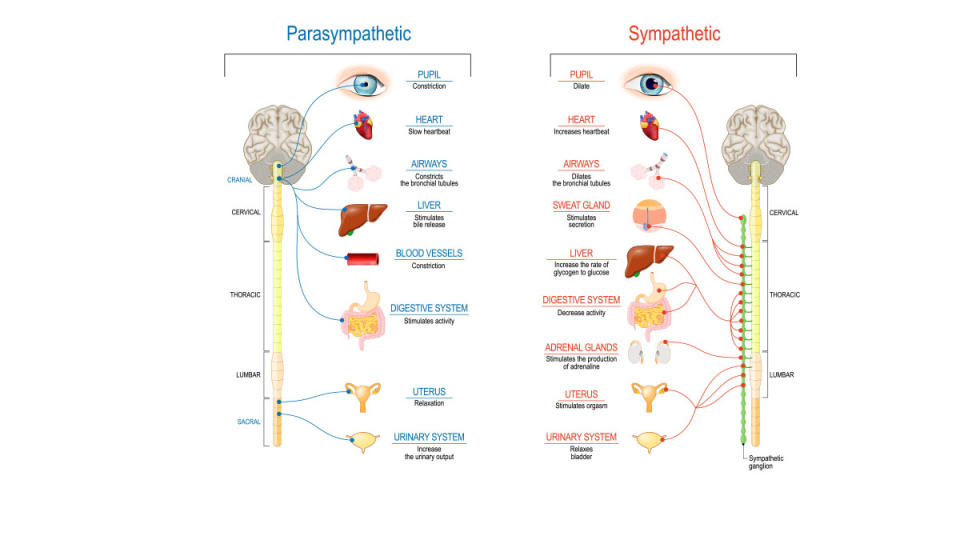Top Doc: The Secret to A Happier Mood + Better Sleep Is a Regulated Nervous System — 7 Easy Ways to Get One!
If you're like us, you go through your days feeling like there just aren't enough hours to get everything done. You hit the sack exhausted and then — irony of ironies — find yourself tossing and turning as your mind spins on some weird worry-wheel. Whether we're running on full tilt at work or juggling caring for various family members for weeks or months on end or just caught in a web of anxiety, all that stress can wreak havoc on our nervous system, causing an imbalance called nervous system dysregulation.
The nervous system is your body’s command center, controlling movements, thoughts and automatic responses to everything you see, hear and feel, so when it gets out of balance or becomes dysregulated, it can trigger a cascade of issues like insomnia, blue moods, anxiety, high blood pressure and more. Fortunately, it's easier than you might think to restore nervous system regulation and reclaim optimum health.
What is nervous system regulation?
Your nervous system is responsible for regulating all kinds of vital bodily functions that occur involuntarily, such as heart rate, blood pressure, digestion, respiratory rate and body temperature, explains Tanmeet Sethi, MD, an integrative medicine physician and author of Joy Is My Justice: Reclaim Yours Now. “There are two main branches of your nervous system: the parasympathetic nervous system and the sympathetic nervous system.”

When you worry or reach your wit’s end, as well as when you take a brisk walk or spend a day digging in the garden, the sympathetic nervous system (SNS) — responsible for the fight or flight response — speeds up your heart rate and increases blood flow, explains Mary Greene, MD, a cardiologist with Manhattan Cardiology in NYC and contributor to LabFinder.com. “The SNS controls the fight or flight response and prepares the body to respond to stress or threats.” It's activated whenever you start mentally or physically amping up.
On the flip side, the parasympathetic nervous system (PNS) activates the rest and digest response, promoting relaxation and restoration. When you're relaxing and the PNS is dominant, your body takes care of all its housekeeping business, like removing debris from cells and repairing different parts of your body.
Harmonious balance between the SNS and the PNS helps keep everything from your heart to your circulatory system and brain running smoothly. But sometimes your sympathetic nervous system starts playing too large a role, preventing your "rest and reset" parasympathetic nervous system from calming you down, says Dr. Sethi. The result? Feelings of overwhelm and anxiety that don't seem to ever go away.
What causes the nervous system to become dysregulated?
When the sympathetic nervous system is chronically activated, the natural to-and-fro with the parasympathetic nervous system is disrupted. This tilt toward the sympathetic nervous system prevents you from properly recovering from a stressful experience and keeps you on high alert. If you remain stressed for a long period of time, this chronically heightened flight-or-fight response can lead to dysfunction of both the branches of the nervous system.
This instability of nervous system function is known in the medical profession as dysautonomia. It's estimated that more than 70 million people worldwide suffer from nervous system dysregulation, which can lead to Postural Orthostatic Tachycardia Syndrome (POTS). Symptoms of POTS include lightheadedness (occasionally with fainting), brain fog, tiredness, difficulty exercising, headache, blurry vision, palpitations, tremor and nausea.
Not surprisingly, the top causes of nervous system dysregulation are a history of trauma and chronic stress — both things that put the sympathetic nervous system on overdrive.
How hard is it to achieve nervous system regulation?
The good news is that getting your nervous system regulated is relatively simple for most people, says Dr. Sethi. You just need to be patient and committed to showing yourself a little self-care. “Nervous system regulation is a skill anyone can develop and use — anytime and anywhere — to improve mental, physical and emotional health.”
How to regulate your nervous system
The first step is knowing — and acknowledging — when your sympathetic nervous system is amped up a little too high. “Pay attention to those moments you might otherwise brush away, like getting irritated in traffic, teetering on the edge of snapping at the cashier in the grocery store or being tempted to type an angry email,” recommends Dr. Sethi. The first twinge of stress, burnout or fatigue signals that it’s time to practice a little on-the-spot nervous system regulation. Here are 7 ways to do so:
1. Try deep breathing
One of the fastest and easiest ways to regulate your nervous system is by taking a deep breath. Indeed, numerous studies tout the benefits of deep breathing for relaxation because a deep belly breath activates the parasympathetic nervous system, signaling your fight or flight response to cool off. Deep breathing during a stressful episode can certainly help, but Dr. Greene also recommends taking 2 or 3 deep breaths a few times daily to help you keep a level head and feel more calm throughout the day. Not sure where to start? Try box breathing: Simply imagine a square in front of you. As you trace each side of the box in your mind, inhale for four seconds, hold for four, exhale for four, then keep your lungs empty for four to complete the box. Repeat four times.
2. Release three long sighs
New research out of Stanford University shows that the reigning champ of stress-reduction — deep breathing — may have a challenger in the form of the long, steady exhale — or what many of us refer to as sighing. We’ve all done it — most of us spontaneously and unconsciously — when we receive a frustrating or disappointing piece of news, or in a period of acute boredom. And now, “cyclic sighing,” or sighing purposefully several times in a row, has been proven to help in nervous system regulation.
It turns that "when you exhale, more blood returns to the heart, stimulating the parasympathetic nervous system,” explains one of the study’s authors, David Spiegel, MD, a psychiatrist and Willson Professor and Associate Chair of Psychiatry & Behavioral Sciences at Stanford University.

Dr. Spiegel recommends trying this: Inhale about halfway through your nose, hold your breath and then breathe in again, filling your lungs all the way. “Make sure you fill your lungs completely, which will give you plenty of air to fully and slowly exhale,” encourages Dr. Spiegel, whose app, Reveri, includes a cyclic sighing tutorial. “Then, exhale through your mouth, making sure that the exhalation is twice as long as the inhalation. Most people see immediate relief from anxious feelings and stress practicing cyclic sighing about three times in a row.” (Click through for more on the benefits of cyclic sighing.)
3. Hum your favorite tune
The vagus nerve, the longest nerve in the body, connects your brain to important organs in your body like your gut, heart and lungs. This vital part of the parasympathetic nervous system helps regulate breathing and mental well-being. Indeed, fully 75% of the parsympathetic nervous system's fibers are housed in the vagus nerve — and the same chronic stress that decreases the parasympathetic nervous system function also decreases vagus function, according to preventive medicine expert and vagus nerve researcher Paul Spector, MD. Dr. Spector estimates stress causes vagus nerve malfunction for 90% of women. And a weak vagus nerve leads to fatigue.
It's relatively simple to keep this nerve in top shape. In fact, research in Cureus showed that humming for 15 minutes boosts vagus nerve function by 176% in one day. You can get similar effects singing or chanting. Don’t worry if you don’t remember all the words, Dr. Sethi says belting out the chorus a few times or even a few lines of a song can spark the positive effects.
4. End your shower with a blast of cold water
Immersing your body in cold water stimulates cold receptors in the skin that activate the vagus nerve. And a study in Aviation, Space, and Environmental Medicine found cold water baths boost vagus nerve activity by 280% in 20 minutes.
But if chilly bath doesn’t sound appealing, try ending your shower with a blast of cold water instead. Virginia Commonwealth University School of Medicine experts say cold showers stimulate cold receptors in skin, too, and so help tone the vagus nerve. (Click through for more easy ways to tone your vagus nerve using cold water.)

5. Quiet your mind
Because meditation lowers your heart rate and blood pressure, Dr. Greene says it’s a great way to relax and practice nervous system regulation. Meditating can take many forms, including sitting quietly to let your mind wander through relieving a happy memory or image. To get the perks, simply find a quiet spot to close your eyes and visualize a beautiful image or memory that fills your heart with joy. Relive the moment or soak up details of the image for a few minutes until you feel calm and in control. (Click through for an easy 5-minute mindfulness meditation practice.)

6. Breathe through your heart
Another technique: Heart-focused breathing. It tames negative emotions that tax the vagus nerve. HeartMath Institute research suggests it enhances heart rate variability, the time between heartbeats that’s used a a gauge of vagus nerve function, by up to 566%.
It's easy to do: Just sit comfortably and place your hand over your heart. Inhale and exhale slowly and deeply while focusing on your heart, as if each breath is moving through it. Remember a time you felt joyful and grateful and try to recreate those feelings as you breathe. Repeat for 15 minutes twice a day. For an app and device that guides you through the technique, try the Inner Balance system (Buy from HeartMath, $199).

7. Add activity to your day
“Exercise stimulates your sympathetic nervous system to work harder, which makes the heart beat faster and blood vessels widen to supply oxygen and blood to your muscles,” explains Dr. Greene. And then after a workout, the parasympathetic nervous system takes over, helping you relax and return your heart rate to normal levels.
These two actions team up to level out the stress hormones cortisol and adrenaline, while increasing happiness hormones called endorphins, which induce a sense of relaxation. “Daily walking or hiking, running, bike riding, swimming or dancing for 20 to 30 minutes will help you tap into the power of nervous system regulation,” says Dr. Sethi.
What are the benefits of nervous system regulation?
Nervous system regulation has long-term effects you’ll feel throughout your entire body, including your heart. “Because the nervous system controls the heart, nervous system regulation helps keep your heart rate and blood pressure normal, lowering the risk of heart diseases like high blood pressure, heart attacks, and strokes,” says Dr. Sethi. And nervous system regulation can help you feel better on a day to day basis. Read on for two fast-acting, feel-great benefits:
Nervous system regulation helps you sleep deeply
Practicing nervous system regulation before bed can enhance sleep quality and facilitate falling asleep faster, according to Dr. Sethi. A team of international researchers agree, finding nervous system dysregulation can lead to insomnia and other sleep abnormalities. Separate research published in Clinical Autonomic Research discovered nervous system regulation can help ease sleep apnea, restless leg syndrome and other sleep stealers.
Nervous system regulation boosts your mood
Since regulating your nervous system increases production of happiness hormones and feelings of calm, it goes without saying that one huge benefit is you’ll feel less stressed. With daily practice, you will not only feel calmer, you’ll be able to apply that calmness to potentially stressful situations, says Dr. Sethi. “The increased feelings of calm, connectedness, belonging improve mood and decrease anxiety, while offering a sense of confidence and resilience as you learn to weather challenges.”
Looking for more easy ways to ease stress? Check out these stories:
Study: This Tea is So Good at Easing Stress, Just Smelling It Works Better Than Meds
Experts Say Fidget Rings Are Powerful Tools For Outsmarting Stress
This content is not a substitute for professional medical advice or diagnosis. Always consult your physician before pursuing any treatment plan.

